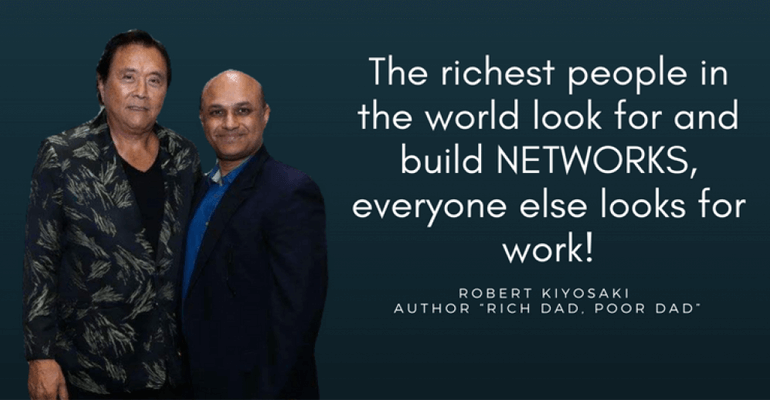
“ The richest people in the world look for and build networks. Everyone else looks for work ” If this famous quote by the celebrated author of the best-seller ‘Rich Dad, Poor Dad’ Robert Kiyosaki is not enough to make you understand the importance of networking, nothing will! He has so aptly captured the essence of networking in such few words.
Given the way the world and global markets are evolving at breakneck speed today, it is no longer enough for people to just work hard to achieve success. It is now as much about working smart and who you know, so you don’t just grow, but can fast-track your growth and 10X yourself to stay ahead of the competition and get noticed. Networking is one of those simple yet effective tools, which if leveraged well, is sure to yield great returns in the long run. When I met Mr. Kiyosaki, it was clear to me that there is a guy who networked his way to the top and I learned a lot from just that one meeting.
So here are 6 golden rules that can help you ace the game of networking:
Determine your goal – The foremost step to figuring out how to grow your
network is to know clearly what to wish to accomplish from it. Are you looking to network in order to tap the right clients for your business or do you want to find a mentor to steer your business in the right direction? Are you looking to identify good vendors to support your processes or do you want to build your network so you can get access to the right talent to drive your business? Answering these questions will be the precursor to moving ahead with the next steps to build your networks such as identifying the right forums to network and the right people to network with.
Don’t be shy – This is one of the top reasons why people don’t network – because they are shy, or afraid. Bill Gates is not only a successful entrepreneur and world-renowned philanthropist – he is also considered one of the best-networked people in the world. Yes, it took him time to build his network, but he also started from a small group of individuals. People always found him reserved, ‘geeky’, but he went out of his way to overcome those stereotypes to truly network himself up. You must, therefore, make it a point to go out and introduce yourself, whether it is a social setting or a business conference. Being reserved and waiting for your potential contact to make the first move may not be a good idea since if that doesn’t happen, it will be an opportunity lost! I have built relationships with some very famous and powerful people, just by having the courage to go up to them and saying ‘hello.’ You’d be surprised how friendly and approachable they really are.
Every meeting is an opportunity – The number of conferences and networking events that happen today are way more than what happened a decade back. That gives you two lines of thought: a. There are more opportunities to meet people and create contacts and b. If not at this conference, I would meet a potential contact at the next event. Probably, this is the reason why many-a-times we tend to avoid certain people in a networking setting because we believe (erroneously) that they are not the people who will be of any use to us (right now). This is, in my opinion, an incorrect way of relationship building. Utilize each networking opportunity to the best of your potential – be approachable, smile, be well-groomed, articulate your thoughts, take interest in group discussions and use it as a cue to develop a relationship. In fact, I have networked with even the so-called smallest guy in the room and built a great rapport with him only to learn later that he was the PA (and confidant) of the most powerful person in the room. So, as the old adage goes, “Do not judge a book by its cover”, you can never judge the value another person can add to your network based on their position.
Follow up & follow up – While you might meet half a dozen people every single day, that doesn’t mean that you have built any relationships. The art to determining how to grow your network does not imply simply meeting, saying hello and exchanging business cards is not good enough for networking to work for you. Take the time to write a ‘thank you’ note, connect with them on LinkedIn and tell them a little more about yourself. And remember, nothing works better than setting up a face-to-face meeting so you can know each other better. If he or she is busy, it’s OK, contact them again at a later date. Research on the person a little more so that you have the relevant topics to discuss and questions to ask when you meet them. The emphasis should be on fostering a long term rapport with the person rather than making it transactional or a one-time affair.
Be of service – All successful relationships are based on equal ‘give or take’. Networking too is a 2-way street, even though you might be the one who ends the inertia. That is why it is necessary that you should not limit networking only to benefit yourself. Make an effort to see how you can add value to your connections too. In fact, your first impression will depend on what you bring to the table for others. Several famous networking clubs like Rotary International, Lions Club, and others are based on service.
Use Social Networks – Last but not least, you probably already have a larger network than you even realize on your social media. So start by identifying the ones you seriously want to build a relationship with and make the first move. You must tap into your LinkedIn profile to reach out to the right people and develop those connections further for the growth of not only your business but yourself. It’s not about just going blindly and connecting with everyone, but to those with whom you might anticipate synergies, shared goals and values.
Gone are the times when networking was perceived as a way to meet your selfish goals. With time, it has become a norm in the corporate world and is seen as a way of building a support system to help each other prosper and thrive. So go ahead and make the most of it! After all, “ It’s not what you know but who you know that matters”.
What do you think? Are you afraid to network? Do you think that networking is overrated and a waste of time? Do you have any good networking stories you would like to share? Let me know your comments.






